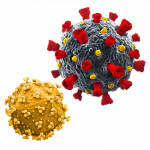One counseling session plus a month of text messaging with a counselor significantly cut the number of cigarettes smoked by people living with HIV in Washington, DC.
These are the findings of a small pilot randomized, controlled trial published in BMC Research Notes. This is important because people living with HIV are two to three times more likely to smoke than the general public, with associated higher rates of smoking-related cancer and earlier onset of chronic lung disease. But non-targeted smoking cessation programs have shown limited success for people with HIV. More and more researchers are targeting smoking cessation programs specifically toward this population.
This trial recruited 25 people living with HIV in the DC area who were enrolled in primary care, were willing to set a stop-smoking date seven days from the start of the intervention and had a mobile phone that could receive text messages.
The participants’ median age was 54 years old. Just over 70% were men, 72% were Black and 76% made less than $20,000 a year. They were also longtime survivors, with a median of 19.5 years living with HIV. Two participants were Native American or Alaska natives, and four were transgender. More than half identified as a sexual minority. They were also highly motivated to quit smoking—52% had tried to quit in the last year.
Fourteen people were randomized to the standard-of-care arm and received one general counseling session based on current guidelines. The 11 participants in the intervention arm received smoking cessation counseling that included discussion of ways to cope with HIV stigma, minority status and financial concerns without smoking. Then they were set up with a texting program where they received two texts a day following up on the messages they received at the session and checking in with how they were doing.
Over one month of follow-up, participants in the intervention arm received a median of 71 texts and sent a median of eight back. At the end of the study, more people had quit smoking in the control group than those in the text-messaging group—five to three, respectively—but this wasn’t statistically significant.
What was significant was that people who didn’t quit smoking in the texting group smoked 13 fewer cigarettes a day than they had at the beginning of the trial, compared with no drop in the standard-of-care group—even though the people in the control group smoked fewer cigarettes at the beginning of the trial than those in the texting group.
However, study author Elexis Kierstead, of the Milken Institute School of Public Health at George Washington University, added that those in the “standard of care” control group were actually probably receiving more smoking support than they would have outside of the trial.
“Few participants reported having been advised to quit by their health care providers in the prior year,” Kierstead and colleagues wrote. “Although [people living with HIV] are consistently engaged with the health care system, providers may be missing opportunities to intervene and may not be providing standard-of-care counseling at the level necessary to create change.”
Click here to read the full study.







1 Comment
1 Comment